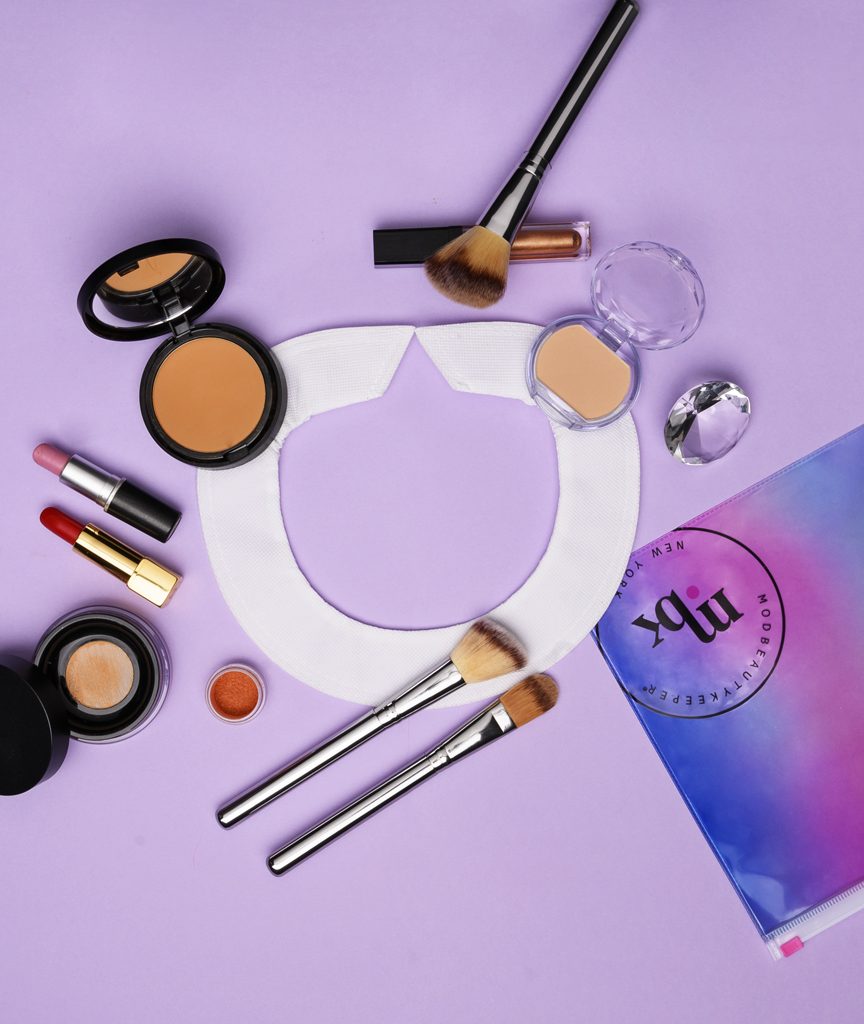
An eco-friendly tool that keeps your makeup on point, on your face, and off your hijab.
Introducing a useful, new concept for women who wear the hijab. After hearing the pain points of customers who kept staining their hijab while doing their makeup, Founder Nandi Barker noticed a gap in the market and soon after conceptualized a simple tool that would alleviate the stress faced by MUA (makeup artists) and Hijabi beauty influencers of getting makeup stains onto their hijabs while glamming.
About ModbeautyKeeper
Modbeautykeeper is a homegrown beauty tool launched in the GCC that prevents make-up from accidentally transferring onto the hijab during application. This unique eco-friendly tool strives to keep your makeup: on point, on your face, and off your hijab. Designed and handmade in Dubai, this is a must-have tool for any modest beauty maven!
1. What triggered you to start modbeautykeeper?
This idea came to mind while I was in Paris on holiday and after watching endless beauty tutorials online, I realized there was always an issue of beauty influencers getting make-up on their hijabs. It was like a eureka moment and once I returned to Dubai I started researching on designing this unique beauty tool to fill the gap in the market.
My goal with this tool is to empower hijab beauty lovers, from influencers to on-the-go modest professionals, makeup artists to beauty enthusiasts, to fully express themselves through makeup, just minus the messy and stubborn cosmetic staining.
2. Can you define the words ‘beauty inclusivity’?
In the past few years, the beauty industry has seen some of the biggest developments around diversity and authentic representation of skin colour, disability, and cultural inclusivity. This growth is playing a vital role in diminishing limitations and encouraging brands within sectors outside of beauty industry to evolve in line with the fundamental changes worldwide. It’s cliche to say “beauty for all” but everyone deserves to be included in the conversation no matter their preference, disability, skin tone or beliefs. Though many leading beauty brands have released an extensive range of complexion make-up products to suit everyone’s perfect nude tone, the limitations for inclusive beauty tools still remains.
With modest make-up applicator tools continuing to be restricted, I developed ModBeautyKeeper to overcome these limitations and allow make-up artists, beauty influencers and on-the-go beauty enthusiasts to apply their products without removing their hijab and avoiding any stains or smudges on their headwear while doing so .
3. What are some tangible examples brands can do to practice ‘beauty inclusivity?’
I think Selena Gomez did a great job with Rare Beauty, but FENTY Beauty really pushed the envelope addressing all skin tones and including hijab beauty lovers in her beauty campaigns which I’ve never seen any brand do. There’s also Milk Makeup that encouraged self-expression through their varied product line addressing all kinds of skin concerns.
I personally think brands should use our community as an inspiration to celebrate beauty for everyone. It’s time brands break the stereotypes and aim for gender diversity, whether this is through extensive shade ranges/ colours or unique beauty tools catering to niche audiences.

4. As you’re a native to NYC, what is one difference in beauty culture in America versus MENA?
I think it definitely depends on the individual and which city you hail from to be honest. I would say in New York perhaps they prefer lighter makeup application during daytime. But I have also always been fascinated by the culture of Emirati women and their beauty rituals. They always seem to have glowing, beautiful skin and I really love how they harness the power of natural potions and botanicals in their everyday beauty routine.
5. What are the general stigmas around beauty in the Arab world?
I think today a lot has changed and homegrown beauty brands and women here are really challenging negative images and portrayals, defying labels and breaking down walls, just by being proud of who they are and by being themselves.
6. Is there a need for global beauty brands to diversify their beauty ambassadors to represent more ethnicities?
It’s important to diversify, of course. As a consumer we make purchases based on our personal reasons and preferences so it’s very essential to make sure the brand resonates and connects with them easily.
7. How can brands use social media to spread awareness about diversity in the industry?
I feel that starts right from your hiring process. Hire people that look like your customers, and if your customer base all look the same, then hire individuals that look different to expand that. Start from your executive positions down to your brand ambassadors as I believe you can really transform your brand with the power of social media!
Social media is instrumental in bringing awareness to issues about diversity and inclusivity – including race, body, positivity, sexuality and gender. Brands should be more creative with their narrative and use the power of social media wisely throughout the consumer’s purchase journey including while creating campaigns and content.
8. What is one piece of advice you have for innovators looking to make a difference in their communities?
Do your research, test the market and trust the process.




